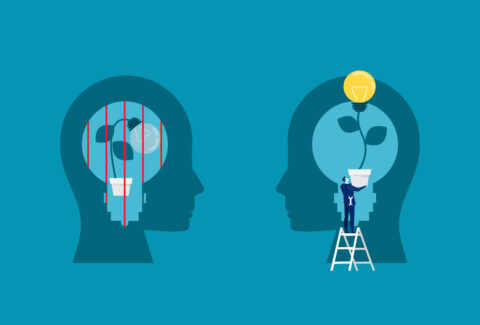Knowledge and Skills in Behavior Change and Motivation
Behavior change and motivation[1] are critical areas of focus in various fields, including mental health, education, public health, and personal development. Understanding the underlying principles and developing the necessary skills to facilitate behavior change can lead to improved outcomes for individuals and communities. This article explores the key knowledge areas and skills essential for effective behavior change and motivation.
Understanding Behavior Change
Behavior change refers to the process of altering behaviors, often to improve health, increase productivity, or enhance overall well-being. It is influenced by various factors, including individual beliefs, environmental cues, social support, and emotional responses.[2] To effectively facilitate behavior change, practitioners must possess a solid understanding of the theories and models that underpin this process.
Key Knowledge Areas
- Theoretical Frameworks: Familiarity with established behavioral change theories, such as the Transtheoretical Model[3], Social Cognitive Theory[4], Health Belief Model, and Self-Determination Theory, is essential. These frameworks provide insights into the stages of change, motivation, and the role of social influences in shaping behavior.
- Motivation: Understanding the types of motivation—intrinsic and extrinsic—and how they influence behavior is crucial.[5] Intrinsic motivation[6] refers to engaging in a behavior for inherent satisfaction, while extrinsic motivation involves performing a behavior to achieve an external reward or avoid negative consequences.
- Cognitive Processes: Knowledge of how cognitive processes, such as beliefs, attitudes, and perceptions, influence behavior change is vital. Cognitive-behavioral approaches can help individuals reframe their thoughts, leading to healthier behaviors.
- Environmental Factors: Recognizing how environmental factors—such as access to resources, social support, and cultural norms—affect behavior change is important. Practitioners must consider these factors when designing interventions.
- Behavioral Change Techniques (BCTs): Familiarity with specific techniques for promoting behavior change, such as goal setting, self-monitoring, reinforcement, and problem-solving, is essential for effective practice.
Essential Skills for Facilitating Behavior Change
In addition to theoretical knowledge, practitioners need a range of skills to effectively promote behavior change and motivation. These skills can be developed through training and practice:
- Effective Communication: The ability to communicate clearly and empathetically is essential in building rapport with clients. Practitioners should be skilled in active listening, providing feedback, and conveying information in a way that resonates with individuals.
- Motivational Interviewing: This client-centered counseling approach helps individuals explore their motivations for change.[7] Practitioners should be trained in motivational interviewing techniques, such as open-ended questions, reflective listening, and summarizing, to enhance client engagement and commitment to change.
- Goal-Setting: Helping individuals set realistic and achievable goals is a key skill. Practitioners should guide clients in creating SMART (Specific, Measurable, Achievable, Relevant, Time-bound) goals to facilitate progress and maintain motivation.[8]
- Behavioral Coaching: Skills in behavioral coaching enable practitioners to provide support and guidance as individuals work toward their behavior change goals.[9] This includes encouraging self-efficacy, reinforcing positive behaviors, and assisting with problem-solving.
- Cultural Competence: Understanding and respecting cultural differences is crucial in behavior change efforts.[10] Practitioners should be skilled in adapting interventions to align with the values and beliefs of diverse populations.
- Assessment and Evaluation: The ability to assess an individual’s readiness for change and evaluate the effectiveness of interventions is important. Practitioners should be skilled in using assessment tools and techniques to monitor progress and make necessary adjustments.
- Adaptability and Flexibility: Behavior change is often nonlinear, and individuals may encounter setbacks along the way. Practitioners should possess the ability to adapt their approach based on individual needs and circumstances.
Conclusion
Knowledge and skills in behavior change and motivation are essential for practitioners working in various fields, including mental health, public health, and education. By understanding the theoretical frameworks, key concepts, and essential skills required for effective behavior change, practitioners can empower individuals to make lasting changes in their lives. Developing expertise in these areas not only enhances professional practice but also contributes to the overall well-being of individuals and communities. As the landscape of behavior change continues to evolve, ongoing education and skill development will be crucial for practitioners seeking to facilitate meaningful transformations in the lives of those they serve.
Are you interested in mastering everything about behavior change, behavior activation, consistency, sustainability, and motivation? If so, you’ll be excited to hear that SWEET Institute has declared the last quarter of 2024 the “Behavior Change Quarter.” Currently running is out 12-week weekly certificate course on behavior activation, and our 8-week master class certificate course on behavior change and motivation. You’ll want to enroll in our upcoming Behavior Activation Virtual Conference scheduled for Friday, October 18, 2024, from 9am-1 pm Eastern Time
[1] Rodgers, Wendy M., and Christina C. Loitz. “The role of motivation in behavior change: how do we encourage our clients to be active?.” ACSM’s Health & Fitness Journal 13.1 (2009): 7-12.
[2] Duckworth, Angela L., and James J. Gross. “Behavior change.” Organizational behavior and human decision processes 161 (2020): 39-49.
[3] Prochaska, James O., and Wayne F. Velicer. “The transtheoretical model of health behavior change.” American journal of health promotion 12.1 (1997): 38-48.
[4] Luszczynska, Aleksandra, and Ralf Schwarzer. “Changing behavior using social cognitive theory.” The handbook of behavior change 2 (2020): 32-45.
[5] Michaelsen, Maren M., and Tobias Esch. “Motivation and reward mechanisms in health behavior change processes.” Brain research 1757 (2021): 147309.
[6] De Young, Raymond. “Encouraging environmentally appropriate behavior: The role of intrinsic motivation.” (1985).
[7] Magill, Molly, and Kevin A. Hallgren. “Mechanisms of behavior change in motivational interviewing: do we understand how MI works?.” Current Opinion in Psychology 30 (2019): 1-5.
[8] K. Harper, Felicity W., et al. “The role of social cognitive processing theory and optimism in positive psychosocial and physical behavior change after cancer diagnosis and treatment.” Psycho‐Oncology: Journal of the Psychological, Social and Behavioral Dimensions of Cancer 16.1 (2007): 79-91.
[9] Frates, Elizabeth Pegg, et al. “Coaching for behavior change in physiatry.” American journal of physical medicine & rehabilitation 90.12 (2011): 1074-1082.
[10] Litvak, Sara Gershfeld, and Hanna Rue. “Creating a culturally competent clinical practice.” Multiculturalism and Diversity in Applied Behavior Analysis. Routledge, 2020. 123-136.









